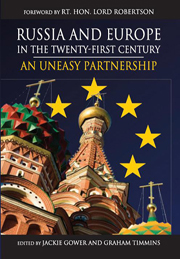Book contents
- Frontmatter
- Contents
- List of Contributors
- Acknowledgements
- List of Abbreviations/Acronyms
- Foreword Russia and Europe
- Preface
- Introduction Russia and Europe: What Kind of Partnership?
- PART 1 Russia looking West
- PART 2 Europe looking East
- Chapter 7 The European Union's Policy on Russia: Rhetoric or Reality?
- Chapter 8 The Role of Norms and Values in the European Union's Russia Policy
- Chapter 9 NATO and Russia: Progress or Process?
- Chapter 10 German-Russian Bilateral Relations and EU Policy on Russia: Reconciling the Two-Level Game?
- Chapter 11 Shortcut to Great Power: France and Russia in Pursuit of Multipolarity
- Chapter 12 A Europe Divided by Russia?: The New Eastern Member States and the EU's Policy towards the East
- PART 3 Partnership in Practice
- Conclusion Russia and Europe: An Uneasy Partnership 289
- Index
- More Titles in this series
Chapter 11 - Shortcut to Great Power: France and Russia in Pursuit of Multipolarity
from PART 2 - Europe looking East
Published online by Cambridge University Press: 05 March 2012
- Frontmatter
- Contents
- List of Contributors
- Acknowledgements
- List of Abbreviations/Acronyms
- Foreword Russia and Europe
- Preface
- Introduction Russia and Europe: What Kind of Partnership?
- PART 1 Russia looking West
- PART 2 Europe looking East
- Chapter 7 The European Union's Policy on Russia: Rhetoric or Reality?
- Chapter 8 The Role of Norms and Values in the European Union's Russia Policy
- Chapter 9 NATO and Russia: Progress or Process?
- Chapter 10 German-Russian Bilateral Relations and EU Policy on Russia: Reconciling the Two-Level Game?
- Chapter 11 Shortcut to Great Power: France and Russia in Pursuit of Multipolarity
- Chapter 12 A Europe Divided by Russia?: The New Eastern Member States and the EU's Policy towards the East
- PART 3 Partnership in Practice
- Conclusion Russia and Europe: An Uneasy Partnership 289
- Index
- More Titles in this series
Summary
Introduction
No developed countries embrace the concept of multipolarity as much as France and Russia do. Using fulsome language on frequent occasions, both sides go to great pains to emphasize their mutual goals to replace the current US-dominated unipolar system with a multipolar world order. ‘France and Russia’, hailed Jacques Chirac, ‘have a common vision of the future…, a certain vision of a multipolar world that takes fully into account the end of the Cold War and the process of reunification of the European continent.’ This is not mere diplomatic pomp. These two countries genuinely see each other as like-minded pioneers in the struggle for multipolarity. Each views itself as a vanguard power, indeed a great power, with a universal mission to help erect a new, multipolar system of international relations. Each envisions this future system as one in which emerging poles of power – including the European Union (EU) (inspired by France), Eurasia (Russia), China, India and Latin America (Brazil) – would join the highest ranks of the international stage within a multilateral, law-based framework, putting an end to ‘unjust’ and ‘unequal’ American unipolarity. Moreover, their multipolar quest even lies at the heart of their bilateral relationship.
None of this is surprising – even though it may seem particularly odd to link France (an established democracy and the seventh largest capitalist economy in the world) and Russia (a ‘bureaucratic authoritarian’ polity with an emerging, state-capitalist economy) in any serious way.
- Type
- Chapter
- Information
- Russia and Europe in the Twenty-First CenturyAn Uneasy Partnership, pp. 185 - 206Publisher: Anthem PressPrint publication year: 2007
- 1
- Cited by



